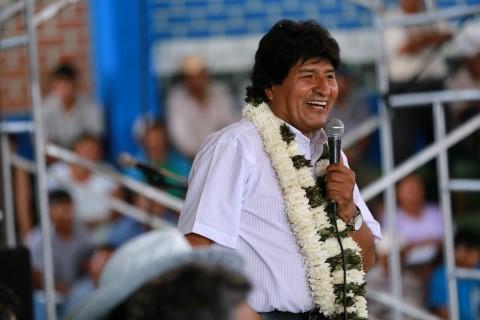The charisma of President Evo Morales
- Análisis

Last March 10, following a public event of strong patriotic symbolism, which assembled tens of thousands of people bearing the flag for the right of access to the sea, President Evo Morales attended the presidential inauguration of Sebastián Piñera, in Chile, where he was received with gestures of friendship, special attention and expectation in international social circles and the media.
He was the person most in demand by the foreign visitors and the press, and he showed clarity, capacity and willingness to explain the Bolivian situation and especially the theses related to the issue in controversy with Chile. His interventions both aimed at developing a fraternal dialogue on the right of access to the sea, and addressed various themes of common interest with the neighbouring country. He indicated that it was time to leave the new generations with the solution to a problem that has lingered for over a century and that inhibits harmonic relations between the two countries.
Emphasizing his openness to dialogue, he said that the time had come “to heal the wounds that we have inherited and to look to the future with greater hope”, advancing in relations of fraternity and integration; and he apologized for the offensive messages that had been spread on social networks. In a colloquial tone, he said that he would have enjoyed playing a game of football with President Piñera, recalling that he had already done so in the past during the previous presidency of the occupant of the La Moneda Presidential Palace.
His visit to the powers installed in Valparaíso and Santiago, just a few days before the presentation of the arguments of Bolivia and Chile to the International Court of Justice of the Hague, on March 19th, concerning the demand of Bolivia to begin a dialogue towards resolving their right of access to the Pacific Ocean, took on even greater importance, considering that it is the final phase of oral allegations over which the Court will adopt a final decision.
It may be recalled that, after various attempts by the Bolivian Government to advance in a bilateral dialogue with the governments of Lagos, Bachelet and Piñera, in which they were open to address a variety of matters, and which had even arrived at a common agenda of thirteen points including the matter of access to the sea, the Chilean government then froze the rapprochement. This situation obliged the La Paz government to turn to international tribunals, to demand a dialogue, taking into account the public declarations of Chilean governing officials during the past century to sekk a solution to Bolivia’s cloistered situation.
This situation of enclosure began with the military invasion by Chilean troops in 1879 in the Bolivian territories of Antofagasta, Tocopilla and Mejillones, in order to enable English companies with Chilean partners to exploit the wealth of guano and saltpeter, natural resources much in demand at that period. This region holds the greatest deposits of copper in the world that have become the principal source of Chilean income over the past fifty years.
The War of the Pacific, that involved the Chilean occupation of territories of Bolivia and Peru, generated a conflict and controversy that in over one hundred years has found no solution and has provoked an unstable situation. Bolivia and Chile signed the Treaty of 1904 in which the Chilean occupation was consolidated and in 1929 Chile signed a similar agreement with Peru, creating a situation that has inhibited complete integration of the region and of South America.
16/03/2018
(Translated for ALAI by Jordan Bishop)
Eduardo Paz Rada, Bolivian sociologist and teacher at the Universidad Mayor de San Simón (UMSA), La Paz. He writes for publications in Bolivia and Latin America.
Del mismo autor
- América Latina y la guerra en Ucrania 14/03/2022
- Industrialización y sustitución de importaciones 01/03/2022
- Bolivia: soberanía en la política internacional 03/01/2022
- A un año de la recuperación democrática en Bolivia 08/11/2021
- Rómulo Calvo: jefe de la oposición en Bolivia 27/10/2021
- El poderoso Brasil en una encrucijada histórica 12/10/2021
- Arce contra el intervencionismo de la OEA 30/09/2021
- Bolivia: la campaña del periódico Página Siete contra Evo y el proceso nacional-popular 01/09/2021
- Recuperar la estrategia geopolítica latinoamericana 13/08/2021
- La guerra mediática contra el gobierno boliviano 21/07/2021








